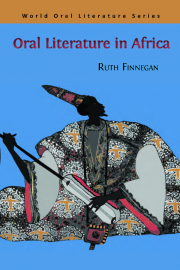Oral Literature in Africa
|Acknowledgements
Texte intégral
1I have many thanks to express. All the editors of the ‘Oxford Library of African Literature’, E. E. Evans-Pritchard, R. G. Lienhardt and Wilfred Whiteley, have helped me in many ways; in particular Wilfred Whiteley has worked through the whole book and made many helpful suggestions and criticisms; his serial letters on the subject over several months were a highlight of 1967–78 and I am more grateful to him than I can say. The following have also read and commented on parts of the book: Dr. G. Innes, Mr. D. K. Rycroft and Mrs. Agnes Finnegan. I have greatly appreciated and profited from their advice (even where I have not taken all of it). I have also had a number of most helpful discussions with Mr. Robin Horton and with my husband, Dr. David Murray. I have obviously used the writings of a great number of people, but would like to mention in particular the stimulus I have received from work by Bascom, Berry, Bowra, Babalola, and, above all, Nketia; I have not always agreed with them or even referred much directly to their work, but have constantly found them illuminating. Finally, the dedication is a serious one. Anything that is of interest in this book is ultimately due to the many people over many years who have taught me—and I do not mean only those who have taught me about Africa or about anthropology.
2I would also like to thank the staff of libraries where I have collected the material used here: especially the library of the (then) University College of Rhodesia and Nyasaland (in particular for allowing me access to the Doke Collection of works on Bantu studies); the library of the University of Ibadan (especially the Africana and reference librarians); and the library of the Institute of Social Anthropology, Oxford. I am also most grateful to the Institute of African Studies, Ibadan, for a grant towards the cost of obtaining photocopies of articles not locally available.
3I would like to thank the following authors and publishers for permission to quote from the published works mentioned:
4Mr. Wande Abimbola (The Odu of Ifa, African Notes 1, 3, 1964).
5Oba Adetoyese Laoye I, The Timi of Ede (The orikis of 13 of the Timis of Ede, 1965).
6Dr. Ethel M. Albert and the American Anthropological Association (‘Rhetoric’, ‘logic’, and ‘poetics’ in Burundi, reproduced by permission of the American Anthropological Association from the American Anthropologist, vol. 66, no. 6, Pt. 2 (1964), pp. 35–54).
7Professor R. G. Armstrong (Talking drums in the Benue-Cross River region of Nigeria, Phylon 15, 1954).
8Professor William Bascom (The sanctions of Ifa divination, JRAI 71, 1941; The forms of folklore: prose narratives, JAF 78, 1965).
9Professor Robin Horton and the International African Institute (The Kalahari Ekine society: a borderland of religion and art, Africa 33, 1963).
10Abbé Alexis Kagame (La poésie dynastique au Rwanda, Institut royal colonial beige, Mem. 22, 1, 1951).
11Professor E. J. Krige and Shuter and Shooter (Pty.) Ltd. (The social system of the Zulus, 1936).
12Mr. L. S. B. Leakey and Methuen & Company Ltd. (Defeating Mau Mau, 1954).
13Mbari publications (B. Gbadamosi and U. Beier, Yoruba poetry, 1959; H. Owuor, Luo songs, Black Orpheus 19, 1961).
14Professor J. H. Nketia (Funeral dirges of the Akan people, 1955; Akan poetry, Black Orpheus 3, 1958; Drum proverbs, Voices of Ghana, Accra, Ministry of Information and Broadcasting, 1958; African music in Ghana, 1962; Drumming in Akan communities of Ghana, 1963).
15Professor Willard Rhodes (Music as an agent of political expression, African studies bulletin 5, 2, 1962).
16Professor M. G. Smith and the International African Institute (The social functions and meaning of Hausa praise-singing, Africa 27, 1957).
17Father F. Theuws (Textes Luba, Bulletin du centre d’étude des problèmes sociaux indigenes (C.E.P.S.I.) 27, 1954).
18Dr. Hugh Tracey (‘Lalela Zulu’, 100 Zulu lyrics, 1948).
19Professor A. N. Tucker (Children’s games and songs in the Southern Sudan, JRAI 63, 1933).
20M. Pierre Verger (Notes sur le culte des Orisa, Mem. IFAN 51, 1957).
21Witwatersrand University Press (extracts from the following articles in Bantu studies and African studies on the pages mentioned: E. W. Grant, The Izibongo of the Zulu chiefs, Bantu studies 13, 1927–9, pp. 211–3, 227; S. K. Lekgothoane, Praises of animals in Northern Sotho, Bantu studies 12, 1938, pp. 193–5; P. A. W. Cook, History and Izibongo of the Swazi chiefs, Bantu studies 5, 1931, p. 193; F. Laydevant, The praises of the divining bones among the Basotho, Bantu studies 7, 1933, pp. 349–50, 361, 369–70, 371; M. Read, Songs of the Ngoni people, Bantu studies 11, 1937, pp. 14–15, 16, 25, 30; B. Stefaniszyn, The hunting songs of the Ambo, African studies 10, 1951, pp. 4, 6, 7, 9, 11; C. Cagnolo, Kikuyu tales, African studies 11, 1952, pp. 128–9; 12, 1953, pp. 129–30).
22‘West Africa’, Orbit House, London, E.C. 4 (R. Schachter, French Guinea’s R.D.A. folk songs, West African review 29, 1958).
23I am also indebted to the Delegates of the Oxford University Press to quote from works published in the ‘Oxford Library of African Literature’, and from L. Harries, Swahili poetry, 1962; R. S. Rattray, Ashanti, 1923; R. S. Fletcher, Hausa sayings and folk-lore, 1912; N. Njururi, Agikuyu folk tales, 1966; H. Tracey, Chopi musicians, 1948.
24I am also most grateful to the following for permission to quote from various unpublished sources:
25The Library, University College of Rhodesia (manuscripts in the Doke Collection).
26Mr. David Rycroft (personal communication quoted in Chapter 5).
27University of the Witwatersrand (S. M. Mofokeng, ‘Notes and annotations of the praise-poems of certain chiefs and the structure of the praise-poems in Southern Sotho’, unpub. honours thesis, 1945).
Le texte seul est utilisable sous licence CC BY 4.0. Les autres éléments (illustrations, fichiers annexes importés) sont « Tous droits réservés », sauf mention contraire.




